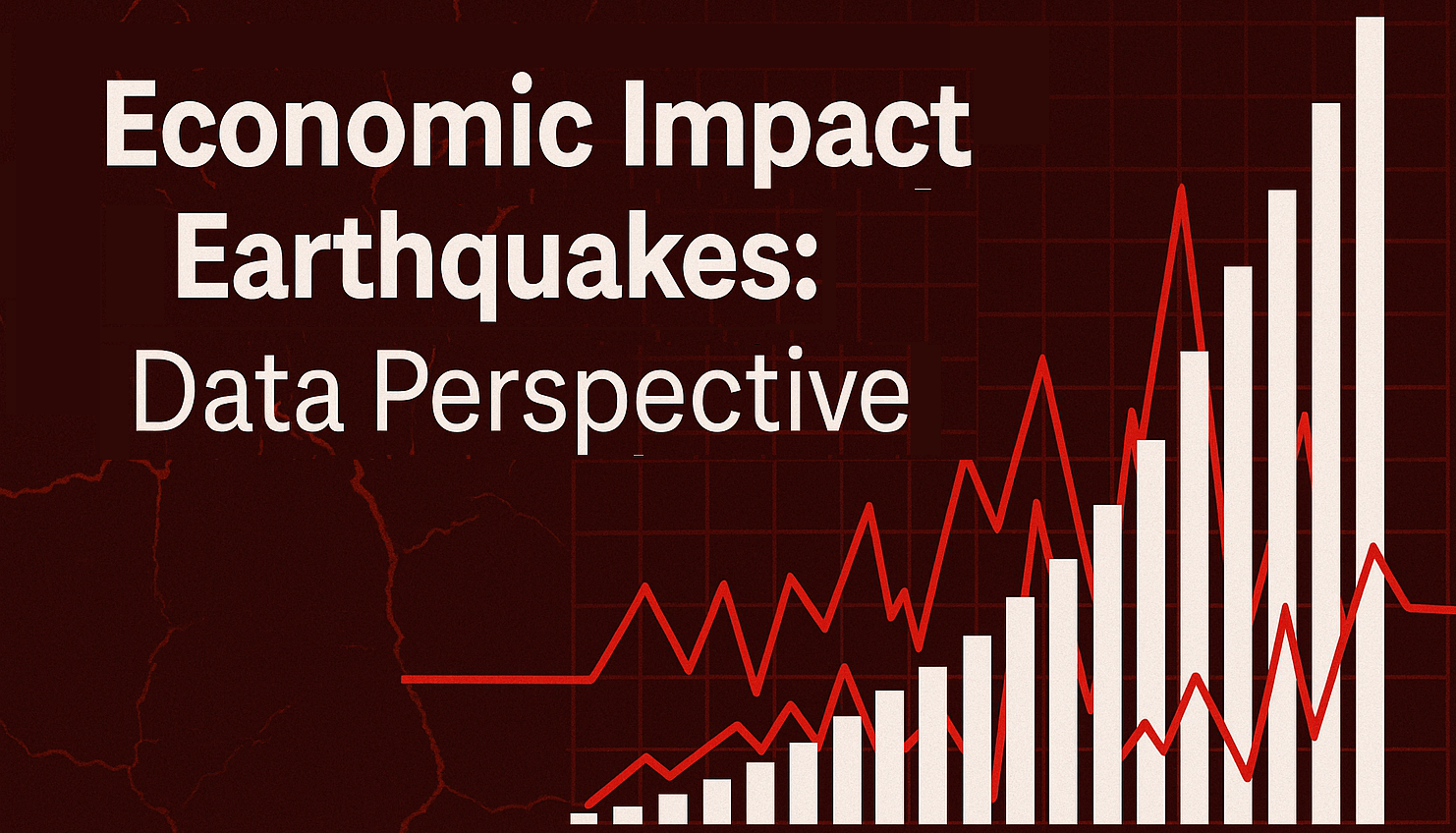The Economic Impact of Earthquakes: A Data Perspective Earthquakes not only devastate communities but also impose severe economic burdens ...
The Economic Impact of Earthquakes: A Data Perspective
Earthquakes not only devastate communities but also impose severe economic burdens on countries and global markets. From the immediate costs of rebuilding infrastructure to the long-term financial impact on businesses and livelihoods, earthquakes can reshape entire economies.
 |
| Long term economic environmental impacts of earthquakes |
In this article, we’ll analyze how earthquakes affect economies, using real-world data to quantify their financial consequences. We’ll also explore mitigation strategies that can help reduce economic losses.
The Direct and Indirect Costs of Earthquakes
The financial repercussions of earthquakes can be divided into two primary categories:
1. Direct Costs: Immediate Economic Losses
These include:
- Infrastructure Damage: Roads, bridges, airports, and buildings are often heavily damaged or destroyed.
- Property Losses: Homes, businesses, and factories suffer extensive damage, leading to massive insurance claims.
- Emergency Response Costs: Governments and aid organizations spend millions on rescue operations, medical aid, and temporary housing.
Case Study: The 2011 Great East Japan Earthquake
- Economic loss: $235 billion (World Bank, 2012)
- Damage to infrastructure: $38 billion (Japan Reconstruction Agency, 2013)
- Costliest natural disaster in recorded history
2. Indirect Costs: Long-Term Economic Effects
These include:
- Business Disruptions: Supply chains are interrupted, leading to economic slowdowns.
- Loss of Productivity: Companies lose revenue due to damaged facilities and workforce displacement.
- Impact on Tourism: Affected regions often experience a sharp decline in tourist arrivals.
- Real Estate Market Disruptions: Property values can plummet, making economic recovery even harder.
Example: Turkey’s 2023 Earthquake
- Estimated economic loss: $100 billion (United Nations, 2023)
- Drop in tourism revenue: 15% decline in affected regions (World Travel & Tourism Council, 2023)
How Earthquakes Affect National and Global Economies
1. GDP Contraction
Countries with frequent earthquakes often see a decline in GDP growth. According to a study by the International Monetary Fund (IMF, 2022), earthquake-prone countries lose an average of 2% of their annual GDP after a major seismic event.
Example:
- Nepal’s 2015 earthquake resulted in a loss of 25% of its GDP (World Bank, 2016).
2. Insurance and Financial Markets
- Global insurance payouts after major earthquakes have surged, putting pressure on the insurance industry. The 1994 Northridge earthquake in the U.S. led to $44 billion in insurance claims (California Department of Insurance, 1995).
- Stock markets in affected countries often experience a temporary decline of 5-10% following a major earthquake (Harvard Economic Review, 2021).
3. Impact on Local Employment
- In heavily affected areas, job losses can exceed 30% due to business closures and infrastructure failures (ILO, 2023).
- Example: The 2008 Sichuan earthquake resulted in over 5 million job losses (Chinese Ministry of Labor, 2009).
Mitigation Strategies: Reducing Economic Losses
1. Investing in Earthquake-Resistant Infrastructure
Countries like Japan and Chile have reduced economic losses through stringent building codes and seismic-resistant structures. Japan’s earthquake-resistant buildings reduced the economic impact of the 2016 Kumamoto earthquake by 40% (Japan Seismological Society, 2018).
2. Early Warning Systems and Disaster Preparedness
- Countries with Earthquake Early Warning (EEW) systems experience fewer economic losses due to rapid evacuations and infrastructure protection measures.
- The ShakeAlert System in California has been estimated to prevent $10 billion in losses annually (USGS, 2023).
3. Government and International Aid
- The International Monetary Fund (IMF) and World Bank provide emergency relief funds to earthquake-affected countries to stabilize economies.
- Example: The World Bank provided $500 million in recovery funds to Haiti after the 2010 earthquake (World Bank, 2011).
4. Encouraging Earthquake Insurance
- Countries like New Zealand and Japan have high earthquake insurance penetration rates, reducing long-term economic burdens.
- Japan’s Earthquake Insurance System covers over 60% of households, ensuring faster economic recovery (Japan Ministry of Finance, 2022).
People Also Ask Questions like:
How do earthquakes impact global trade?
Earthquakes disrupt supply chains, delay shipping, and cause price fluctuations. Example: The 2011 Japan earthquake led to a global shortage of auto parts and electronics (Harvard Business Review, 2012).
Which industries suffer the most economic losses from earthquakes?
- Construction
- Manufacturing
- Tourism
- Retail
What was the costliest earthquake in history?
The 2011 Japan earthquake was the most expensive, with damages exceeding $235 billion (World Bank, 2012).
Can a country’s economy fully recover after a major earthquake?
Yes, but recovery depends on government policies, international aid, and rebuilding efforts. Countries with strong infrastructure and economic resilience recover faster.
Are there economic benefits from earthquakes?
While earthquakes are destructive, they can lead to economic booms through reconstruction efforts, job creation in construction, and new infrastructure development (OECD, 2021).
Conclusion: The Cost of Earthquakes and the Path Forward
Earthquakes impose heavy financial burdens, but data-driven strategies can help reduce economic losses. Investing in earthquake-resistant infrastructure, early warning systems, and insurance coverage can significantly mitigate the long-term impact.
Governments, businesses, and individuals must take proactive steps to prepare for future earthquakes and ensure economic stability in seismic-prone regions.
Want to Learn More About Data Analysis?
If you’re fascinated by how data can uncover insights into natural disasters and economic impacts, our courses can help you develop skills in SQL, Tableau, and Excel for real-world data analysis. Enroll now and start exploring the power of data!







No comments